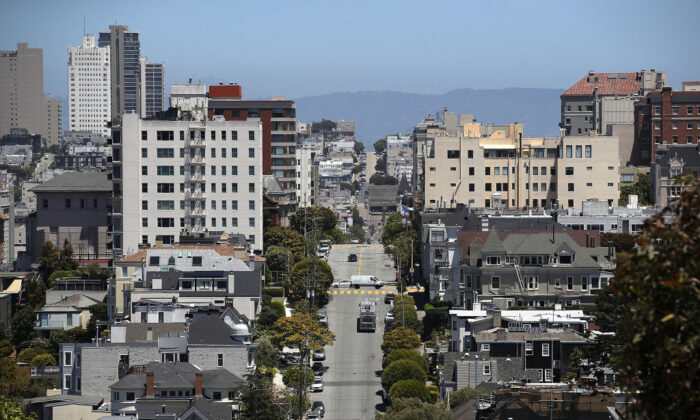
A view of homes and apartments in San Francisco on June 13, 2018. (Justin Sullivan/Getty Images)
California Bay Area to Start Banning Gas Furnaces and Water Heaters
Authorities from the Bay Area in San Francisco have decided to ban the use of natural gas-fired water heaters and furnaces, citing pollution and health concerns.
The Bay Area’s Air District Board of Directors made amendments to certain regulations to eliminate nitrogen oxide (NOx) emissions from residential and commercial natural gas furnaces and water heaters by mandating that new appliances comply with zero-emission standards.
“The rule amendments would apply only to new appliances and do not mandate the immediate change out of existing appliances, nor will they apply to appliances used for cooking, such as gas stoves,” according to a March 15 press release.
According to new amendments, only “zero NOx” water heaters can be sold or installed in the Bay Area beginning in 2027. Two years later in 2029, only zero NOx furnaces will be allowed to be sold or installed in the region. And in 2031, new commercial water heaters in the Bay Area will have to meet zero NOx standards.
NOx emissions are said to contribute to particulate matter and have been linked to wheezing, breathing difficulties, coughing, asthma, and susceptibility to respiratory infections, the Bay Area’s Air District Board of Directors said. Exposure to particulate matter has been linked with asthma, heart attack, neurological disease, lung cancer, and premature death, the board said.
Air District claims that the new amendments will improve air quality, prevent an estimated 85 premature deaths and dozens of asthma cases in the Bay Area annually, and save up to $890 million per year in health impacts resulting from air pollution exposure.
“The 1.8 million water heaters and furnaces in the Bay Area significantly impact our air quality, resulting in dozens of early deaths and a wide range of health impacts, particularly in communities of color,” Philip Fine, executive officer of the Air District, said in the news release. “This groundbreaking regulation will phase out the most polluting appliances in homes and businesses to protect Bay Area residents from the harmful air pollution they cause.”
Though gas stoves have been exempted from the Bay Area ban, federal agencies have indicated that they are considering tougher restrictions on these appliances.
In February, Richard Trumka Jr., commissioner for the Consumer Product Safety Commission (CPSC), stated that the federal government could ban natural gas stoves.
The Biden administration denied that such a move was under consideration, but CPSC later announced it was soliciting information regarding the safety of such stoves, which could be the initial step toward restrictions. The Department of Energy has also proposed energy efficiency standards for residential stoves, which some believe could hit gas stoves harder than their electric counterparts.
Expensive Transition for Households
If adopted, the Bay Area’s amendment updates are expected to affect roughly two-thirds of all households in the region estimated to use natural gas appliances. The development could hit such households financially as gas heating tends to be cheaper than alternatives like electricity.
According to the U.S. Energy Information Administration, average household spending on natural gas heating in the United States for winter 2022–23 was pegged at $931, far cheaper than the average spending on heating via electricity at $1,359.
The Bay Area’s ban on gas-fired furnaces and heaters comes amid a wider crackdown on NOx emissions.
In September 2022, the California Air Resources Board approved a proposal to ban such gas-powered appliances from homes by 2030.
The board directed state agencies to come up with a rule to phase out these appliances—an issue that will be voted on in 2025.
Recently, the U.S. Environmental Protection Agency announced a new rule aimed at cutting down nitrogen oxide pollution from power plants and other industrial facilities in 23 states.
The new rule is projected to reduce “ozone season NOX pollution by approximately 70,000 tons from power plants and industrial facilities in 2026,” according to a March 15 press release. It is also expected to prevent about 1,300 premature deaths, the agency claimed.
From theepochtimes.com